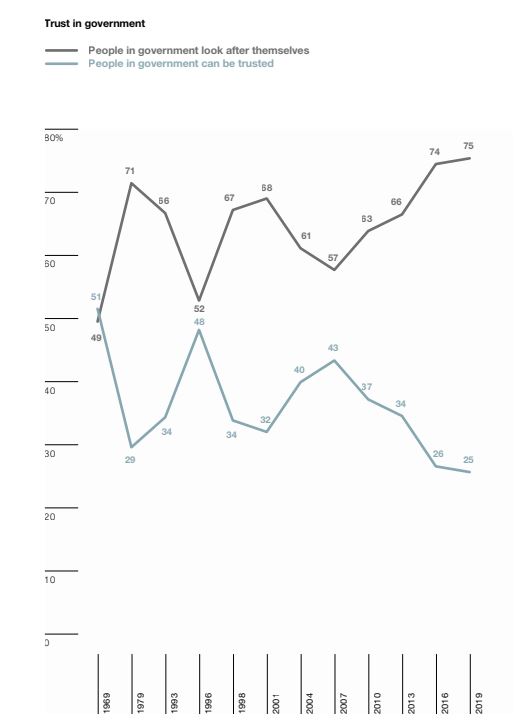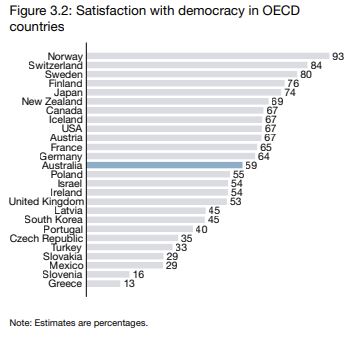
Three in four people believe people in government only look after themselves and only one in four think they can be trusted, according to an ANU study which found trust in government and government institutions has reached a historic low point in Australia.
The ANU’s 2019 Election report surveyed Australian voters about a range of issues and found a pattern of declining citizen trust in the political system since 2007.

Voters were asked “In general, do you feel that the people in government are too often interested in looking after themselves, or do you feel that they can be trusted to do the right thing nearly all the time?”
Just 25 per cent said they believed people in government could be trusted, the lowest level of trust ever recorded, and down from a peak of 51 per cent in the first year the survey was done in 1969.
Trust in government has also declined by nearly 20 per cent since 2007, when trust was at 43 per cent.
Government for ‘a few big interests’
There was a similar answer to the question: “Would you say the government is run by a few big interests looking out for themselves, or that it is run for the benefit of all the people?”
More than half (56 per cent) said they believed government is run for a few big interests, compared to 12 per cent who believe it’s run for all. Twenty-one per cent don’t think it makes any difference who is in power.
In 2019, just 59 per cent of Australians said they were satisfied with democracy, the lowest since the dismissal of Gough Whitlam. Satisfaction with democracy in Australia has also plummeted more sharply in Australia than in the UK following Brexit and the US following the election of Donald Trump.
Australia was thirteenth on the ladder in terms of OECD satisfaction with democracy. Norway tops the list with 93 per cent satisfaction and Greece languishes down the bottom with just 13 per cent.
The study found economic management was the most important policy issue in this year’s election for 24 per cent of voters followed by tax health and Medicare (22 per cent). Refugees (3 per cent), immigration (3 per cent) and government debt (2 per cent) were the least important.
Government performance driving dissatisfaction
“I’ve been studying elections for 40 years, and never have I seen such poor returns for public trust in and satisfaction with democratic institutions,” lead researcher Professor Ian McAllister said.
“With faith in democracy taking major hits all over the globe, winning back the people’s trust and satisfaction would appear to be one of the most pressing and urgent challenges facing our political leaders and institutions.”

Co-author Dr Sarah Cameron from the University of Sydney said the strong decline in trust was the result of a combination of factors including poor government performance and increasing voter cynicism.
“Voters are increasingly getting their information from the internet rather than more traditional forms of media so that has an impact, and generational also change has an impact,” she told Government News.
“But those gradual changes over time don’t explain the very rapid decline that we have seen in trust and satisfaction with democracy since 2007.
“My analyses show that this is driven by government performance, including perceived poor economic performance, dissatisfaction with frequent leadership changes and the perception that politicians are more interested in fighting among themselves and advancing their own careers rather than governing in the nation’s best interests.”
Comment below to have your say on this story.
If you have a news story or tip-off, get in touch at editorial@governmentnews.com.au.
Sign up to the Government News newsletter